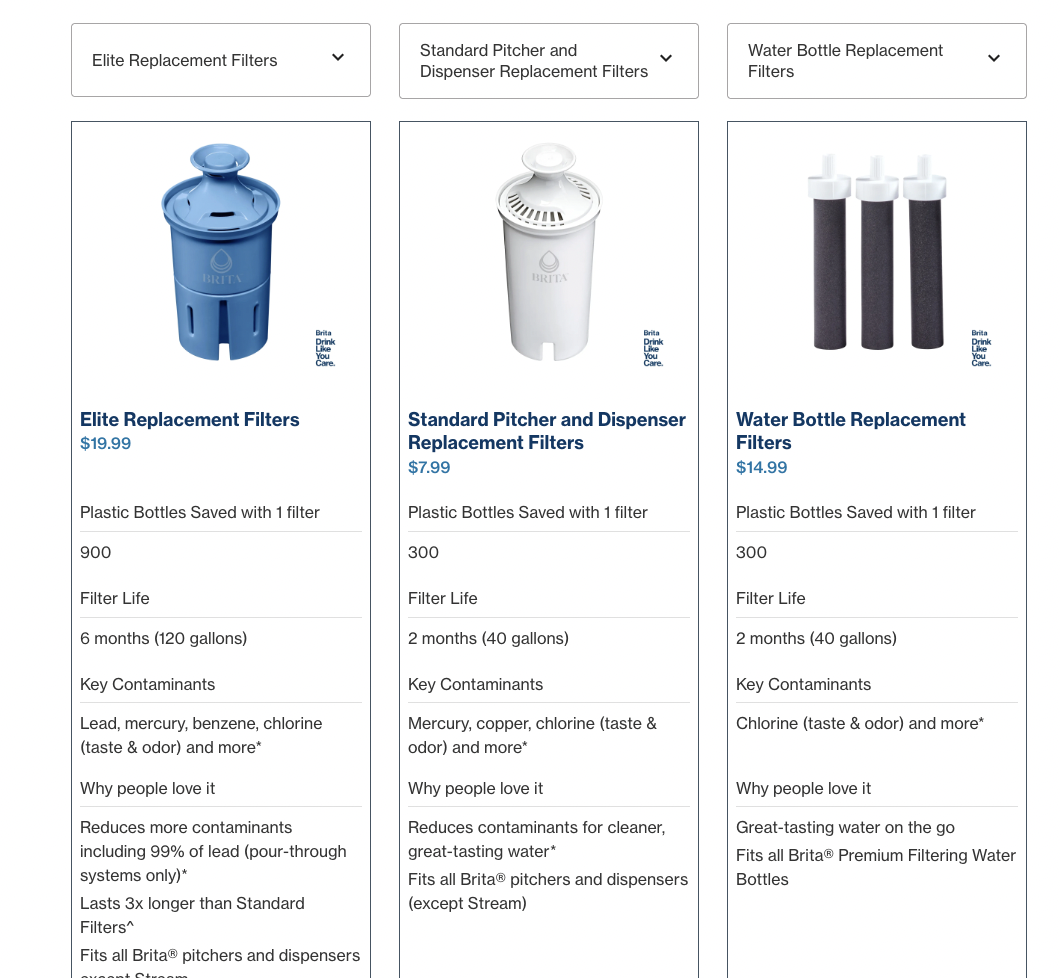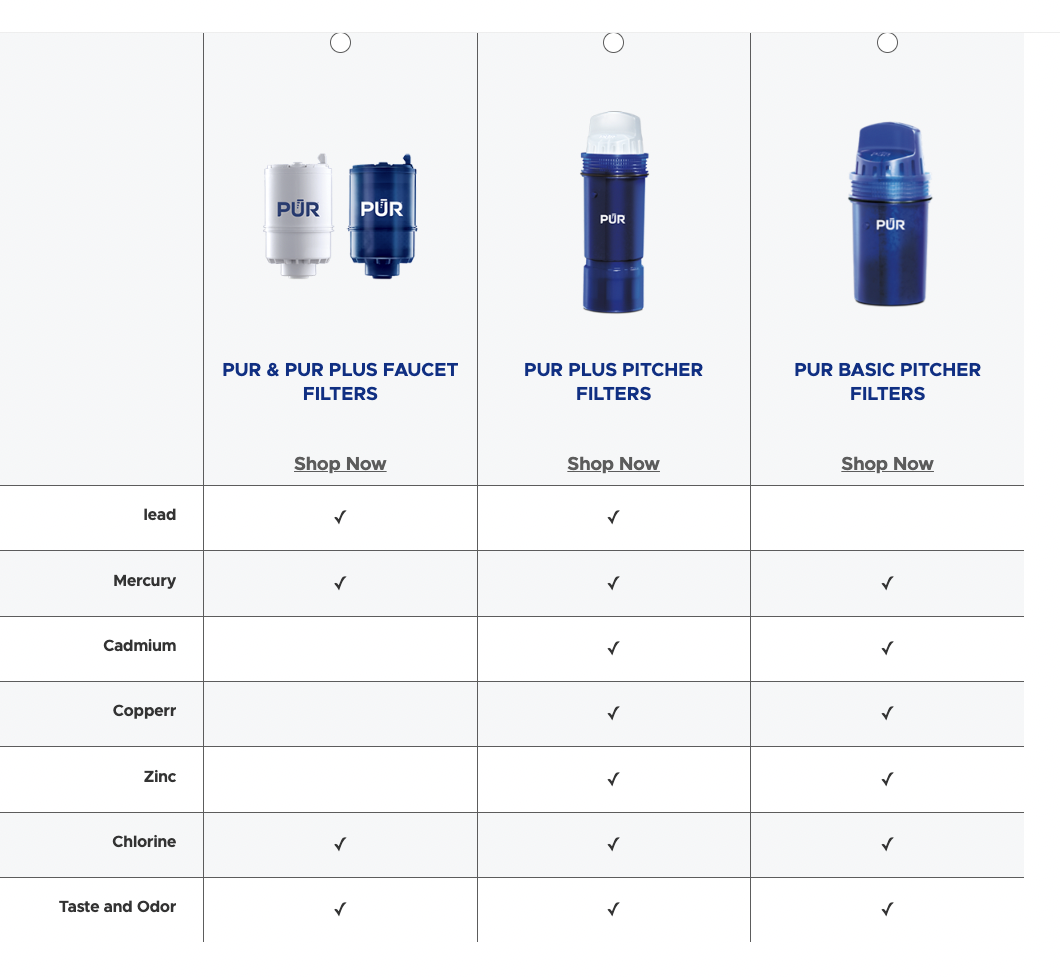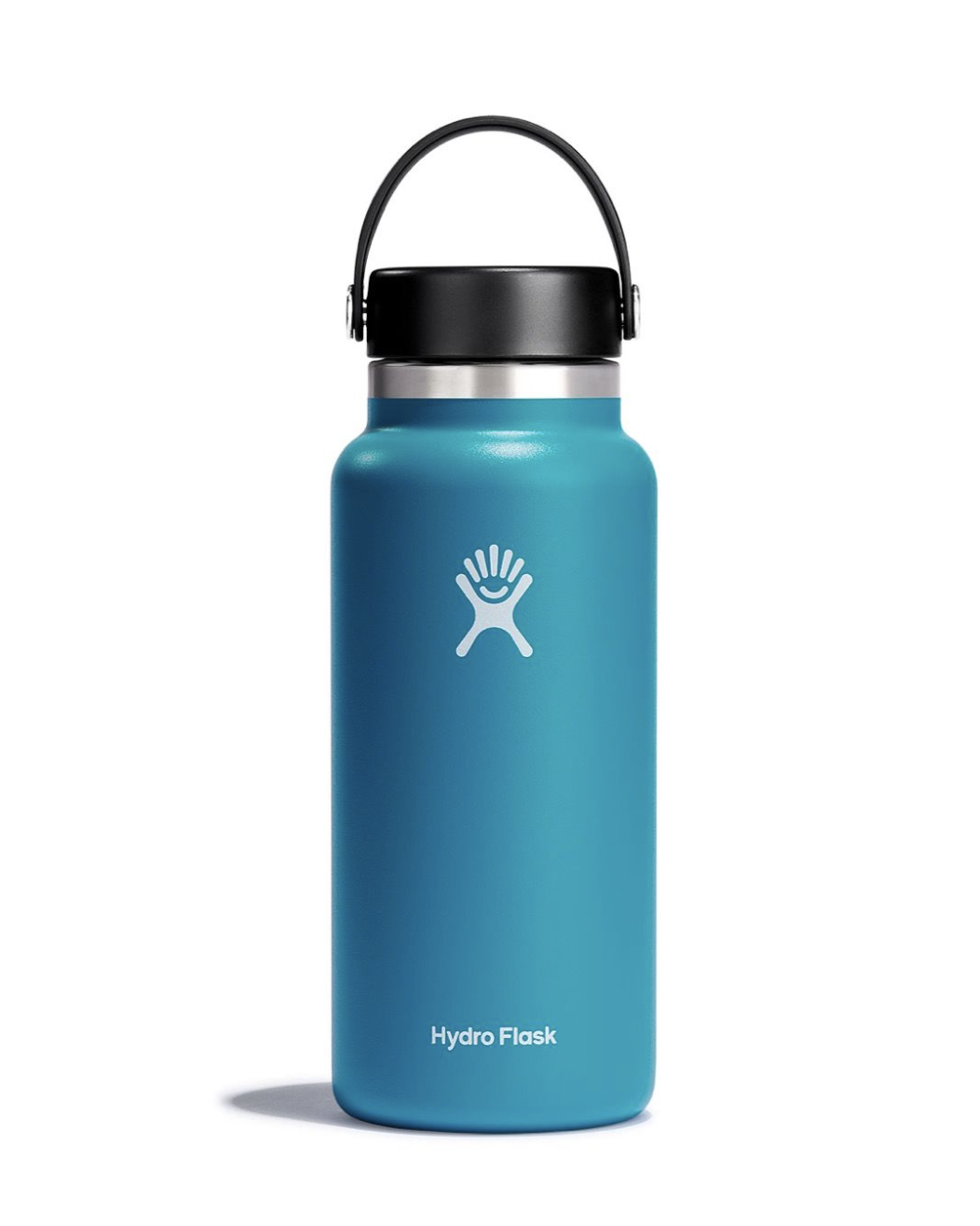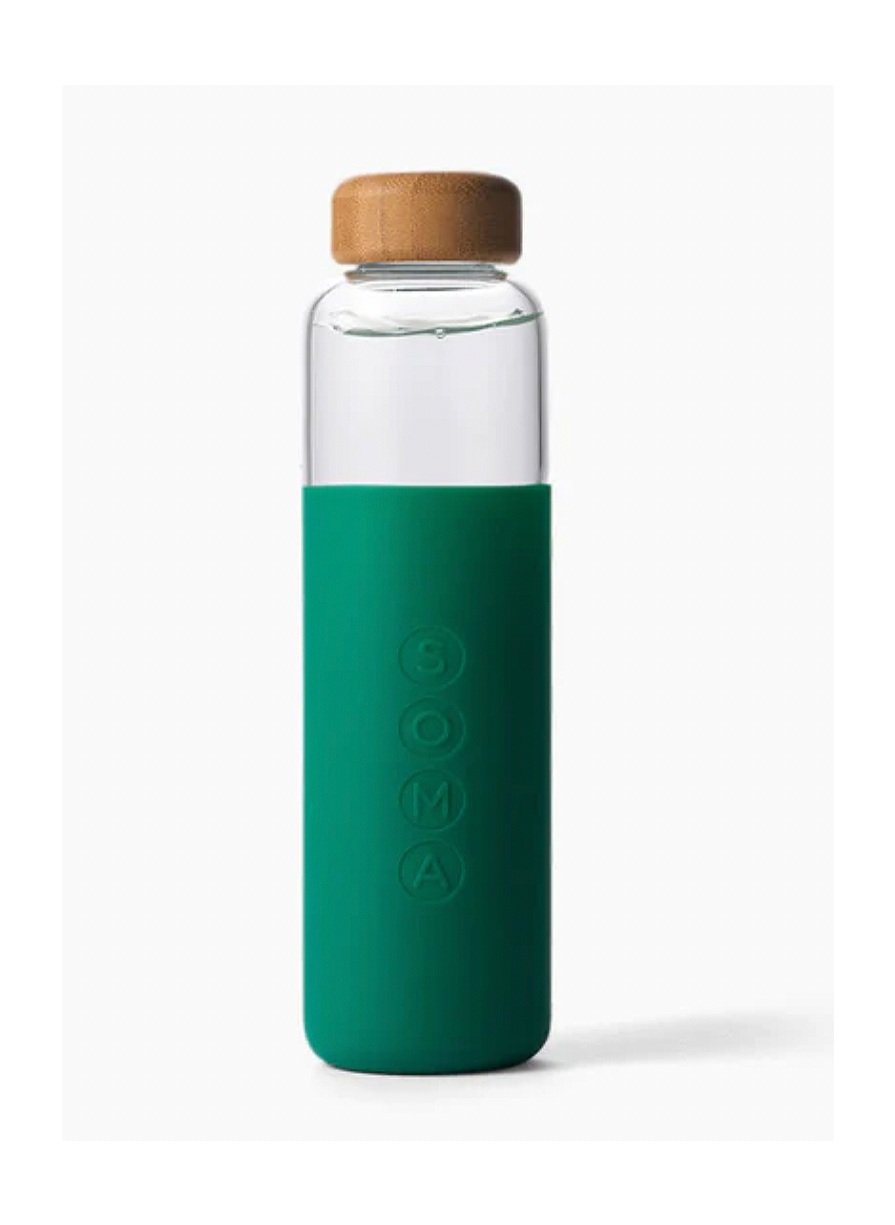Pur Vs Brita: Best Countertop Water Filter
Intro
Filtered water is such a hot topic, there are many different kinds of filters. Countertop water filtration systems, water pitchers, and even faucet filters.
When choosing what's right for you and your family, start by looking at your space, and your price sensitivity and then look at what emerging contaminants these filters actually remove.
In a perfect world, you want the most thorough filtration processes, like a reverse osmosis system. But they can be really pricy. There are other solutions to start with.
Most commonly we think of Brita filters and PUR filters. They do improve water taste, but I get into more of the details below and keep scrolling to find the best countertop water filter options.
Both Brita filters and PUR are better than bottled water. Remember to limit your exposure to plastic bottles by using your own metal or glass water bottle. It's cheaper and safer! Some water filters even come for water bottles themselves.
Should I even drink filtered water?
You should start by taking a look at the quality of the water in your area (I share details on how further below). Our drinking water often contains contaminants at a much higher concentration than recommended safe levels. If you're experimenting with lowering your toxins and endocrine disruptor exposures, water is a fantastic place to start.
By simply switching out tap water for filtered water (which is easy to do at home and doesn't require you to buy lots of bottled water), you're going to be lowering your day to day exposure tremendously.
Brita Water Filter or PUR?
Both Brita and Pur are better than nothing. However, if you are choosing only between these two options:
When choosing between PUR vs Brita filter. Buy PUR.
Brita filters I've found are easier to come by and are relatively inexpensive. But, they only filter out lead. Many countertop water filters claim to improve water quality, and they do, but to varying degrees.
Brita offers different pitcher filters like the Metro Water Pitcher. They're relatively inexpensive at $21.99 and uses an activated carbon filter. It does remove contaminants, but not to the degree that you probably need.
Pur however has more options that clear out more than just lead. PUR faucet filter is easy to install at home, and has a pretty fast filtration speed. Their starter set is also $22.
Are Brita and PUR Filters the same?
On the grocery store shelf, Brita and Pur can seem the same, but ultimately they actually filter different contaminants.
Brita focuses the majority of its contaminant filtering to lead. Lead of course is not good and should be eliminated from your drinking water, but I'm sad to report there are actually other things in your water you should be worried about.
Here are some charts of how the different tiers of Brita and Pur compare to each other.
Looking at what’s in your water is a crucial step to beginning to clean up your lifestyle.
The first place I started was with the Environmental Working Group, I live in New York and so the water is considered “really good”. But I wanted to know more, I wanted a report on the quality of what is coming out of the tap.
When you go to the EWR site, you can actually put your zip code in and it’ll come up with a report. Here’s what mine looked like.
Environmental Working Group Report on Water
They even go into what contaminants in the water are problematic and the amount that exceeds the EWR Health Guidelines. Here’s another image of what my report looked like.
You can clearly see that there are carcinogens that do NOT make me comfortable. That’s when I decided to invest in a good water filter.
How much water should you drink in a day?
But first, how much water should you be drinking in a day? According to the Mayo Clinic website, “U.S. National Academies of Sciences, Engineering, and Medicine determined that an adequate daily fluid intake is:
About 15.5 cups (3.7 liters) of fluids a day for men. About 11.5 cups (2.7 liters) of fluids a day for women.”
What is that in ounces you ask?
15.5 cups is 124 ounces (or a little less than 8, 16 ounce containers) for men. 11.5 cups is 92 ounces or 6 of those 16 ounce water bottles. Of course you’re probably getting hydration from other sources (some in your food, water, coffee, other beverages you drink).
So now that you can answer the question, “how much water should I drink in a day”, you’re probably wondering how to pick the best water filters.
Which Water filter removes the most contaminents?
The first thing to note is that Pur and Brita are not good enough water filters on their own. I know, it’s really upsetting, but the reality is you need something heavier duty to tackle all these rogue carcinogens in the water. There are a few different categories of filters:
Water pitchers/counter top (these sit on the countertop and you refill)
Water bottles (yes they exist in smaller format)
Household systems (these tend to be more expensive but the system works for the whole house).
According to Water Filter Guru the best water filters for PFAs (remember those “forever” chemicals found in literally everything nonstick), are SpringWell CF Whole House Filter, Clearly Filtered Water Filter Pitcher, and Big Berkey Gravity-Fed Water Filter.
The Springwell CF1 model says: Our system uses the highest quality catalytic carbon and certified kdf media to target and remove harmful contaminants like chlorine, chloramine, PFOA, PFAS PFOS, pesticides, herbicides, haloacetic acids and more.”
The cost will put you back around $1000-$1500 without add ons, but it’s robust and once installed is a lot easier.
This is the water filter I have at home. It’s $90 for the pitcher and the filters cost around $50. I find they’re good for about 6-8 weeks, and the filtration starts to slow down as the filter get to the end of its life. I like that Clearly Filtered also has water bottles that are great for traveling.
According to the site: “Berkey ® Systems equipped with Black Berkey ® Purification Elements remove up to 99.999% of viruses and 99.9999% of pathogenic bacteria, while also removing or dramatically reducing protozoa, trihalomethanes, inorganic minerals, heavy metals, pharmaceuticals, pesticides, VOCs, petroleum products, perfluorinated chemicals, rust, silt, sediment and even radiologicals.”
This purifier costs about $400 but lasts 6,000 gallons or about 5 years of continual use according to the website.
Whatever you choose to use for your water filtration, know that you want to look for brands that are filtering PFAs and take a deep dive into what other chemicals they filter out.
Brita for example states they only filter for a few of the chemicals/metals we’re concerned about mainly chlorine, mercury, copper and cadmium.
Do your research, see how the water in your area looks and decide what water filtration system is best for you. It can be a rather large cost so be sure to buy according to what seems right for your family and lifestyle.
Favorite Water Bottles
Maybe you've taken the plunge and have a water filter that you feel really good about. Remember what you drink that water out of is also very important. If your filter capacity is smaller, remember you can always get a glass pitcher to fill up with additional water so you always have it on hand.
Plastic water bottles are handy, but they do leach contaminants into your water.
These contaminants cause a host of issues. Your water bottles and food containers, the hard plastics contain Bisphenol-A or BPA. But, there are really two types of toxins in your food containers that you should care about. You can read more about the effects of BPA and Phthalates in this NYTimes article.
The two endocrine disruptors explained:
Bisphenol-A (BPA): BPA commonly found in plastic, and the lining of aluminum cans (and even feminine hygiene products), is considered a phytoestrogen.
What does this mean?
Phytoestrogens mimic estrogen in the body. It causes oxidative stress in the body as well as, reproductive issues for both men and women. So you want to make sure that once you've taken the enormous leap to get yourself a countertop water filtration system and are drinking filtered water, that you're using a safe vessel to drink out of.
Phthalates: Phthalates like BPA are endocrine disruptors (meaning they mess with your hormones). I've written about what they are here. Phthalates are usually found in softer plastics like food wrap, and cosmetics (think deodorant, lotions, etc).
So now that you're aware and probably concerned about what containers you're drinking out of. Here are my favorite bottles to use that are free from BPA and Phthalates.
Getting that great countertop water filtration system is only half the challenge.
Best Water Bottles for your filtered water
Hydro Flask
Hydro Flask has a variety of options for travel containers, thermoses and water bottles made out of metal. They also come in a range of colors and once again are a BPA/Phthalate free option for your filtered water. I have the Hydro Flask travel coffee mug, and can't recommend it enough. If anything it keeps my hot tea, hot for even too long (is that a thing? Apparently it is).
T
here are so many colors, sizes, style varieties that you're going to find something that works for you. Remember too how much good you're doing for yourself and the earth by using a reusable bottle.
SOMA
Pretty much all glass bottles will work as an alternative to stainless steel. The caveat here obviously is that it's glass so you have to be a lot more careful (no one likes picking up a bunch of broken glass). But they make for easy travel, you don't have to worry about the chemicals seeping into your water.
Many of the stainless steel companies will have insulated options, obviously, glass is a different situation, but if you're simply looking for a flat water travel container, glass is a really good option.
Clearly Filtered Water Bottle
What's great about Clearly Filtered, is even in addition to their water filter pitcher, they have on-the-go water bottle options. This is particularly great for traveling. The filter is in the bottle, so fill up in the sink or a water fountain and the bottle will do the rest of the work. This is a great way to filter water without a larger water filter system. This uses an activated carbon filter and is a great replacement for bottled water.














